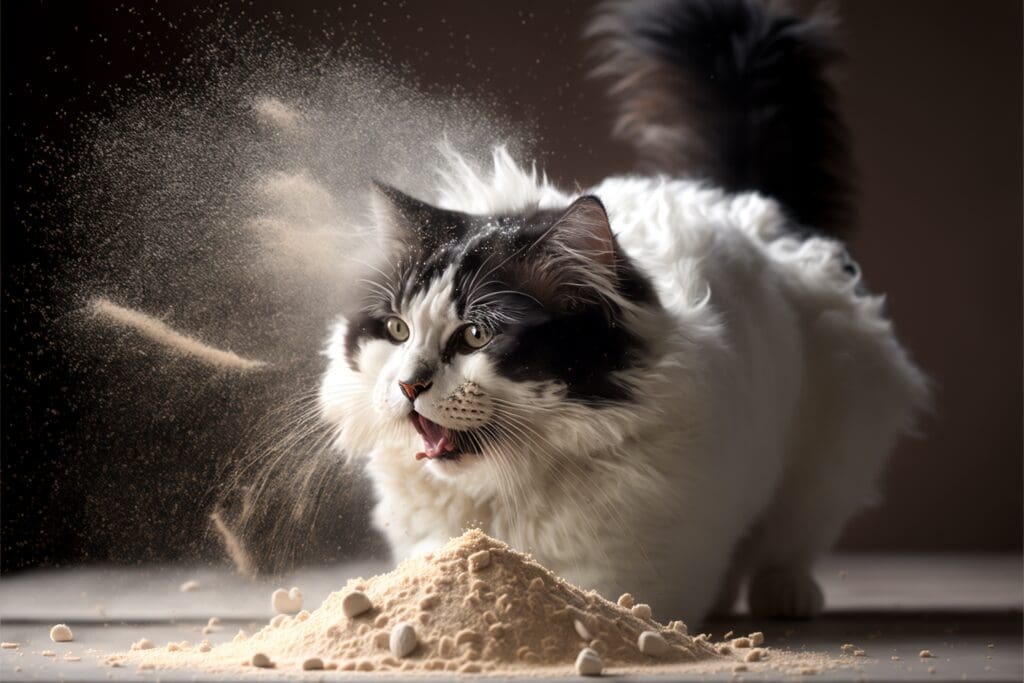Last Updated on January 7, 2023 by admin
It is generally safe for cats to eat flour, although it is not advisable to let them consume it raw due to the fact that it can contain bacteria such as E. coli. However, cats can have flour in small amounts, as long as it is not part of their regular diet. While an occasional bite or two won’t cause them any harm, it is important to note that flour contains a high degree of gluten which can be filling for pets.
What Is Flour?
Flour is made from the endosperm of grains, like wheat, rye, and barley. It’s a white powdery substance that is used in many food recipes, including cakes, cookies, and other baked goods. Flour is high in carbohydrates and contains protein, minerals, and vitamins. It is also a source of dietary fiber. All these nutrients are beneficial for cats, although they should not consume large amounts of flour since it can be difficult for them to digest.
Why Do Cats Eat Flour?
It’s not uncommon for cats to be attracted to flour and other grains. While it’s not natural for cats to eat grains, they may find the taste and texture of flour appealing. Flour also has a high carbohydrate content, which cats may find satisfying. In addition, cats may be attracted to the smell of flour and may try to eat it out of curiosity. It’s important to keep an eye on your cat when they are around flour, as they may be tempted to eat too much of it.
Are There Nutrients in Flour?
While cats can digest flour, it does not provide them with any significant nutritional benefits. Flour is mainly composed of carbohydrates, which cats cannot make use of. It’s also low in protein, which is essential for cats. Additionally, flour is low in vitamins and minerals, making it an inadequate source of nutrition for cats.
Are There Any Risks Associated with Eating Flour?
Flour may not be the healthiest food on the menu for cats, but it is generally considered safe. However, there are still some risks to consider. Raw flour can contain bacteria such as E. coli, so it is not advisable to let your cat consume it. Uncooked flour dough is also dangerous to cats because it can expand in their stomachs, causing digestive issues. It’s important to make sure your cat only eats cooked or baked flour products. Additionally, cats should not eat flour regularly, as it can lead to nutritional deficiencies over time.
What Are the Benefits of Eating Flour?
The benefits of eating flour for cats are mostly limited. The primary benefit is that it can be a source of carbohydrates, which can provide the cat with energy. However, the amount of carbohydrates found in flour is very minimal, and cats typically don’t need to rely on carbohydrates for energy. Additionally, flour does not contain any important vitamins or minerals that cats need for a balanced diet. Therefore, while it can provide a small benefit in terms of energy, it’s not something that should be a regular part of your cat’s diet.
Can Cats Eat Flour Safely?
It is important to note that cats should not consume large amounts of flour or raw dough, as it can be difficult for them to digest. However, small amounts of flour or baked goods made with flour are safe for cats to eat in moderation. Additionally, there are some potential benefits that may come from eating flour, such as providing essential nutrients and aiding in digestion. While it is not necessary for cats to eat flour, it can be a safe treat for them in moderation. It is important to remember that cats should also avoid other foods such as garlic, onions, chocolate, and grapes, which can be toxic for them.
Do Cats Need to Eat Flour?
While cats can eat flour safely, they do not need to eat flour in order to be healthy. Flour is mostly carbohydrate and lacks the essential nutrients cats need to thrive. Cats are obligate carnivores, which means they require a diet that is high in protein and fat. Flour does not provide enough of these essential nutrients and should only be given as an occasional treat. Cats should get the majority of their nutrition from a balanced diet of animal proteins, such as meat, fish, eggs, and dairy products. It’s important to remember that cats require specific amounts of certain vitamins and minerals in their diet to keep them healthy and happy.
What Other Foods Should Cats Avoid?
It’s important for pet owners to be aware of what their cats can and cannot eat, and to ensure that they are not feeding them dangerous foods. While cats can eat flour, it is important to remember that there are many other foods that cats should avoid. This includes onions and garlic, which can be toxic to cats. Chocolate and caffeine also pose a risk, as they can cause a range of symptoms in cats such as diarrhea, vomiting, and even seizures. Additionally, dairy products should be avoided as cats lack the enzyme needed to break down lactose. Raw eggs should also be avoided, as they can contain harmful bacteria such as salmonella. Finally, cooked bones should never be given to cats, as they can splinter and cause internal damage.
